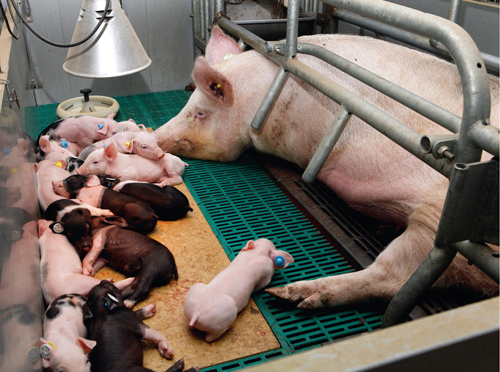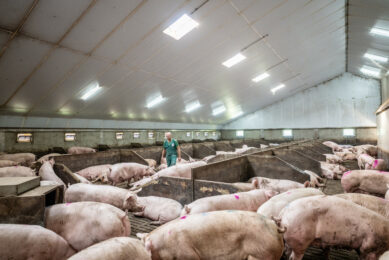How peptides can improve reproduction parameters

Besides genetics, environmental, management and nutritional factors all play a crucial role in the never ending search to optimise sow productivity. In the time around weaning thenumber of ovulatory follicles will be determined – these will grow to become the potential next offspring. Make the number of follicles grow – and the litter size will grow too.
In the ongoing search to increase reproduction performance in sows, realising the genetic potential of modern sows is a big challenge. With steadily growing litter sizes, the pressure on the normal physiological parameters in sows, especially during lactation, is rapidly increasing. Higher numbers of piglets per sow increases the chance of sows becoming catabolic; reaching a state of a negative energy and/ or nitrogen balance. This imbalance will occur when feed intake cannot match requirements for maintenance and production which will result in an extended weaning to mating interval and subsequently a possible delay of in heat behaviour, a lower fertility and a drop in reproductive performances.
Recent research showed that feeding a combination of several feedstuffs or even a single supplement in feed around weaning, improves reproduction parameters. A frequently used practice in this field is ‘flushing’. Flushing is aimed at reducing the effect of a negative energy balance (NEB) that high production sows can experience during lactation. This NEB can hamper fertility and reproduction.
Potato peptides
A novel development may assist in this situation. As discussed in Pig Progress 28.03, fermented potato peptides can have positive effects when fed to piglets, see the article ‘Potato peptides improve piglet performance’. The product range introduced in that article, Lianol by Huvepharma, can also help sows overcome the difficult phase described above. For a detailed initial mode of action of this range, please turn to the article referred to above. Suffice to say here that during the production process, a specific bacterial strain ferments the potato protein into bio-active peptides.
A novel development may assist in this situation. As discussed in Pig Progress 28.03, fermented potato peptides can have positive effects when fed to piglets, see the article ‘Potato peptides improve piglet performance’. The product range introduced in that article, Lianol by Huvepharma, can also help sows overcome the difficult phase described above. For a detailed initial mode of action of this range, please turn to the article referred to above. Suffice to say here that during the production process, a specific bacterial strain ferments the potato protein into bio-active peptides.
These peptides influence IGF-1 (Insulin-like Growth Factor 1) levels in animals. IGF-1 plays a crucial role in hypothalamic- pituitary-ovarian hormone controlled metabolic processes. It is well known that gonadotropin release hormone (GnRH) is the key regulator in reproductive physiology. This GnRH stimulates both the secretion of luteinising hormone (LH) and follicle stimulating hormone (FSH). Both hormones are essential in the normal functioning of the gonads. Any malfunction of this system will result in increased weaning-oestrus intervals, impaired fertility and anoestrus. Data obtained in different species indicate that there are stimulatory, synergistic or permissive effect of growth hormone (GH) and IGF-1 on the release of GnRH and gonadotropins (including LH and FSH) and on the level of gonadotropin receptors on the ovarian granulosa cells.
Furthermore, in vitro research has demonstrated a positive effect of IGF-1 on the porcine oocyte maturation and pre-implantation embryo development. IGF-1 secretion by the liver cells can be affected by a number of factors, such as immune system activation due to infections, inflammation or viruses. Heat stress or negative energy balance are also recognised to reduce GH receptor sensitivity leading to reduced levels of IGF1. This is induced through transcriptional gene silencing of the genes that encode for the GHR.
All these data suggest that IGF-1 plays a significant role in fertility and reproduction.
Study
A special study was set up in the Netherlands to demonstrate the effect of potato peptides (Lianol Ferti) on IGF-1 levels in sows around weaning. The trial consisted of a control group of 15 sows and another group of 15 sows that are supplemented with potato peptides. Blood serum was collected twice in all sows; just before and just after the start of the supplementation. When evaluating IGF-1 levels, it is important to evaluate the difference of two consecutive measurements to exclude inter-animal variation in basal IGF-1 levels. The administration of potato peptides resulted in a more than threefold higher increase in IGF-1 levels compared to the control treatment (see Figure 1). As already stated above, IGF-1 plays a crucial role in fertility and reproduction, therefore, a follow up-trial was started with focus on sow reproduction parameters.
A special study was set up in the Netherlands to demonstrate the effect of potato peptides (Lianol Ferti) on IGF-1 levels in sows around weaning. The trial consisted of a control group of 15 sows and another group of 15 sows that are supplemented with potato peptides. Blood serum was collected twice in all sows; just before and just after the start of the supplementation. When evaluating IGF-1 levels, it is important to evaluate the difference of two consecutive measurements to exclude inter-animal variation in basal IGF-1 levels. The administration of potato peptides resulted in a more than threefold higher increase in IGF-1 levels compared to the control treatment (see Figure 1). As already stated above, IGF-1 plays a crucial role in fertility and reproduction, therefore, a follow up-trial was started with focus on sow reproduction parameters.
This trial was conducted at Pig Innovation Centre Sterksel (part of Wageningen University, the Netherlands). Reproduction parameters of a control group of 43 sows were compared with the results of a group of 43 sows that received potato peptides around weaning. Both groups had an equal parity distribution. The litter size and litter weight was observed. This trial demonstrated a large effect both on live born and total born piglets per litter. Supplementing the new product resulted in an increased litter size of 0.76 piglets. Then number of live born piglets per litter increase by 0.66 per litter (see Figure 2). With increasing litter size, it can be expected that the birth weight will go down. In this trial, only a slight decrease in individual birth weight could be noted. The total litter weight in the ‘potato’ group, however, slightly increased by 135 g per litter.











